Timothy Leary found out just how screwy America’s cannabis laws were when he got busted for violating the 1937 Marijuana Tax Act.
Leary faced a 30-year prison sentence, so he hired a team of lawyers to defend him in court. They argued the law violated his Fifth Amendment right protecting him against self-incrimination. They reasoned he had to tell federal authorities he possessed pot so they could tax it. But state laws made cannabis possession a crime.
In 1969, the U.S. Supreme Court agreed with Leary and ruled the 1937 Marijuana Tax Act unconstitutional. Leary then went on to run for governor of California. (He didn’t win.) He had a campaign song called Come Together, which his friend John Lennon wrote.
Then in 1970, Congress further complicated the laws governing cannabis by making possession of it a crime.
It was a funny way to treat a plant that the early colonists were required to cultivate and which doesn’t always get you high.
Cannabis
Some strains of cannabis have compounds that alter the mind, while others don’t.
Humans have bred cannabis plants in Asia since as early as 8000 B.C. They cultivated hemp for fiber to make clothes and rope. Later they bred strains for medicine and for getting stoned.
The English colonies passed the first cannabis law in 1639. The Massachusetts General Court ordered every household to plant the weed. Connecticut then followed the next year. They did it because of a rope shortage — they needed the hemp.
The early New England farmers grew plenty of cannabis. For example, 220,000 pounds of fiber from the cannabis plant went into the rigging of Old Ironsides.
Patent Medicines
Cotton eventually surpassed cannabis as the agricultural fiber of choice. But patent medicine makers continued to use cannabis as an active ingredient in over-the-counter remedies. People used it as a tincture or an oil to cure gonorrhea and asthma, and to ease the pain of childbirth.
Drug stores also sold dried marijuana in one-ounce packages. Two cigarettes cost a dollar.
By the turn of the 20th century, things began to change. States passed poison laws, which required medicine makers to label certain kinds of ingredients. In 1905, poison laws in both Vermont and Maine mentioned cannabis. But Rhode Island’s didn’t.
Then in 1906, the federal Pure Food and Drug Act required products with cannabis to carry labels.
Massachusetts went even further in 1911, making cannabis possession a crime. Lawbreakers paid a fine and served a three- to six-month prison sentence. The law had an exception, though, for doctors, nurses and veterinarians with a license to prescribe the stuff.
The Massachusetts law, like others, didn’t distinguish between cannabis that produced a high and cannabis that didn’t. Other states soon followed and made all cannabis possession a crime.
Immigration
Drug laws also began to take on an anti-immigrant taint. Since the American Revolution, medical doctors freely gave opium to their patients. Then the Civil War caused widespread drug addiction. Doctors gave large quantities of opium and morphine to wounded soldiers and, later, to sickly women.
That was okay. But it wasn’t okay when Chinese immigrants on the West Coast started opening opium dens. So Congress decided to step in. The Harrison Narcotics Tax Act of 1915 banned opium for non-medical reasons. It also required doctors who prescribed opium to register with the federal government.
In the American Southwest, the 1910 Mexican Revolution drove immigrants into the United States. Some of them liked to smoke cannabis recreationally. People viewed them as the “marijuana menace.”
The 1937 Marijuana Tax Act
That set the stage for the 1937 Marijuana Tax Act. A hard-nosed FBI agent named Harry Anslinger wrote the bill, and he testified cannabis could cause violent delirium. He called it “marijuana’ rather than cannabis. After all, “marijuana” sounded foreign and therefore more sinister.
Anslinger claimed a 20-year-old “axe-murdering marijuana addict” named Victor Licata had killed his entire family. In truth, Licata suffered from mental illness and didn’t smoke pot.
Anslinger also ignored a doctor who looked at 2,216 criminal cases and found cannabis had influenced exactly zero. And he paid no attention to the American Medical Association, which strongly opposed the bill.
Evidence suggests that powerful corporations had an interest in suppressing cannabis. Dupont, which made nylon and rayon, feared competition from hemp fiber. Newspaper magnate William Randolph Hearst, who owned paper mills, thought hemp might be used to make paper.
And so Congress passed the 1937 Marijuana Tax Act. Then in 1951, Congress passed the Boggs Act, which imposed a mandatory minimum prison sentence of two to 10 years for possession of cannabis. Two months after President Harry S Truman signed the bill, 500 people were arrested for marijuana possession in one day.
Timothy Leary
Timothy Leary, a leader of the ‘60s drug counterculture, was born into a well-to-do Springfield, Mass., family in 1920. A great uncle, another Dr. Timothy Leary, served as Boston’s medical examiner, and his grandfather was believed to be the richest man in western Massachusetts.
The grandfather, however, squandered his money, and when his son found out he abandoned his family when Timothy was 13. That perhaps explains Timothy Leary’s behavior problems. He got kicked out of high school, expelled from Holy Cross, silenced at West Point, expelled from the University of Alabama and fled to Europe — twice. But he did manage to earn a PhD from the University of California by the time he reached 40.

Timothy Leary, John Lennon, Yoko Ono and others singing ‘Give Peace a Chance’
He won an appointment as a lecturer in clinical psychology at Harvard University. While at Harvard, he studied the effects of psychedelic drugs on personality. But Leary also used drugs recreationally, and in 1962 Harvard fired him.
Monstrosity
In 1965, he got busted for cannabis possession in Laredo, Texas, and charged under the Marijuana Tax Act of 1937. In developing his defense, he learned about the federal weed law. Leary called it “a bizarre monstrosity from the bureaucratic standpoint and unconstitutional from the legal standpoint.”
Under the law, people couldn’t buy tax stamps without providing details about the amount and location of their marijuana. And marijuana, of course, was illegal.
The high court sided with Leary in 1969, and Congress repealed the law the next year. But Congress also passed the Comprehensive Drug Abuse Prevention and Control Act of 1970. The law put cannabis in the most restrictive category of controlled substances.
Lawmakers reasoned cannabis was dangerous because of its “high potential for abuse,” “no currently accepted medical use” and a “lack of accepted safety.”
Since then, researchers have concluded cannabis does have therapeutic effects. Opinion vary, though, on how addictive and dangerous it is. By 2021, 36 states and the District of Columbia have made cannabis possession legal, at least for medicinal purposes.
And in 2018, the federal Farm Bill legalized cannabis for industrial use. That “unleashed a potential economic dynamo for American farmers,’” according to Forbes magazine.
Images: Harry Anslinger By Source, Fair use, https://en.wikipedia.org/w/index.php?curid=34928390. Timothy Leary with John and Yoko By Roy Kerwood – Originally uploaded to English Wikipedia by Roy Kerwood, CC BY 2.5, https://commons.wikimedia.org/w/index.php?curid=44122819. This story was updated in 2022.
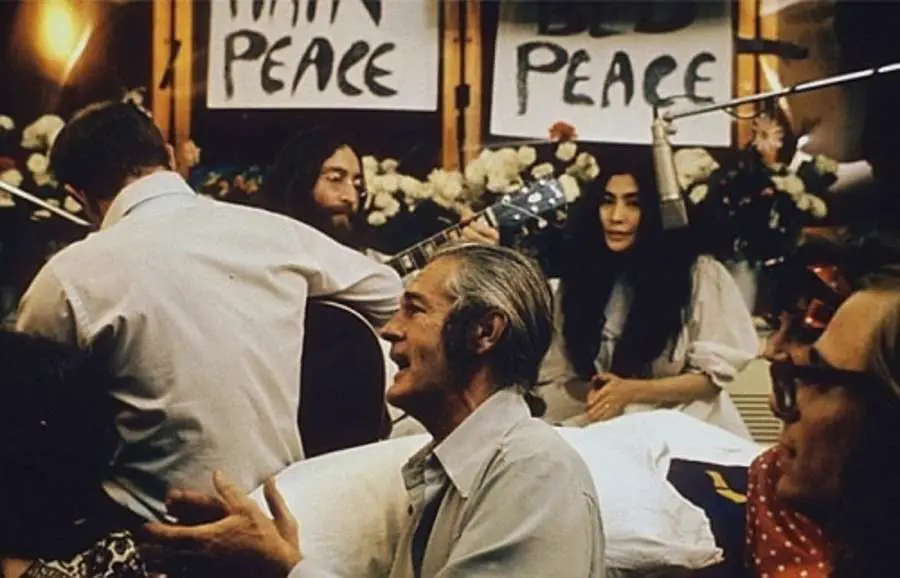
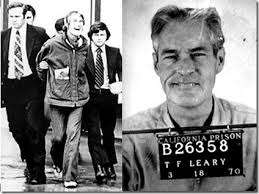
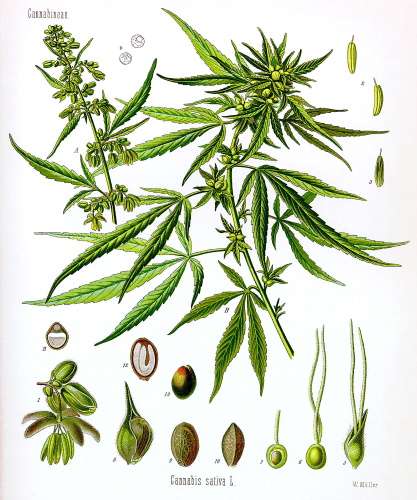

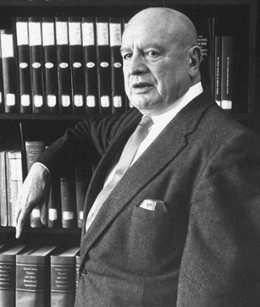
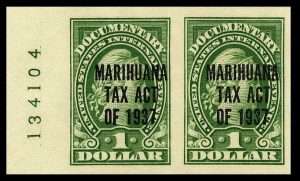
3 comments
What a well researched and telling argument; documenting current history, such as this article, provides landmark evidence anchored to reality. In its absence, the recovery of source records adds exponentially increased time and often, supposition in place of factual history.
It would be lovely if the NEHS would publish the continuing story that includes analysis of whether pharmaceutical companies, religious idealists, and liquor companies have interfered with legalization.
[…] tax act was overturned in 1969. Unfortunately, that’s not where the story […]
[…] tax act was overturned in 1969. Unfortunately, that’s not where the story […]
Comments are closed.